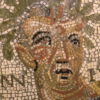The man of firm and righteous will,
No rabble, clamorous for the wrong,
No tyrant’s brow, whose frown may kill,
Can shake the strength that makes him strong.[Iustum et tenacem propositi virum
non civium ardor prava iubentium,
non voltus instantis tyranni
mente quatit solida]Horace (65-8 BC) Roman poet and satirist [Quintus Horacius Flaccus]
Odes [Carmina], Book 3, # 3, l. 1ff (3.3.1-4) (23 BC) [tr. Conington (1872)]
(Source)
(Source (Latin)). Alternate translations:An honest and resolved man,
Neither a peoples tumults can,
Neither a Tyrants indignation,
Un-center from his fast foundation.
[tr. Fanshaw; ed. Brome (1666)]Not the rage of the people pressing to hurtful measures, not the aspect of a threatening tyrant can shake from his settled purpose the man who is just and determined in his resolution.
[tr. Smart/Buckley (1853)]He that is just, and firm of will
Doth not before the fury quake
Of mobs that instigate to ill,
Nor hath the tyrant's menace skill
His fixed resolve to shake.
[tr. Martin (1864)]Not the rage of the million commanding things evil,
Not the doom frowning near in the brows of the tyrant,
Shakes the upright and resolute man
In his solid completeness of soul.
[tr. Bulwer-Lytton (1870)]Neither the fury of the populace, commanding him to do what is wrong, nor the face of the despot which confronts him, [...] shakes from his solid resolve a just and determined man.
[tr. Elgood (1893)]The just man, in his purpose strong,
No madding crowd can bend to wrong.
The forceful tyrant's brow and word,
[...] His firm-set spirit cannot move.
[tr. Gladstone (1894)]Him who is just, and stands to his purpose true.
Not the unruly ardour of citizens
Shall shake from his firm resolution,
Nor visage of the oppressing tyrant.
[tr. Phelps (1897)]The upright man holding his purpose fast,
No heat of citizens enjoining wrongful acts,
No overbearing despot's countenance,
Shakes from his firm-set mind.
[tr. Garnsey (1907)]The man that's just and resolute of mood
No craze of people's perverse vote can shake,
Nor frown of threat'ning monarch make
To quit a purposed good.
[tr. Marshall (1908)]The man tenacious of his purpose in a righteous cause is not shaken from his firm resolve by the frenzy of his fellow citizens bidding what is wrong, not by the face of threatening tyrant.
[tr. Bennett (Loeb) (1912)]Who loves the Right, whose will is resolute,
His purpose naught can shake — nor rage of brute
Mob bidding him work evil; nor the eye
Of threatening despot
[tr. Mills (1924)]A mob of citizens clamouring for injustice,
An autocrat's grimace of rage [...] cannot stagger
The just and steady-purposed man.
[tr. Michie (1963)]The man who knows what's right and is tenacious
In the knowledge of what he knows cannot be shaken.
Not by people righteously impassioned
In a wrong cause, and not by menacings
Of tyrants' frowns.
[tr. Ferry (1997)]The just man, tenacious in his resolve,
will not be shaken from his settled purpose
by the frenzy of his fellow citizens
imposing that evil be done,
or by the frown of a threatening tyrant.
[tr. Alexander (1999)]The passion of the public, demanding what
is wrong, never shakes the man of just and firm
intention, from his settled purpose,
nor the tyrant’s threatening face.
[tr. Kline (2015)]Neither the passion of citizens demanding crooked things,
Not the face of a threatening tyrant
Shakes the man who is righteous and set in purpose
From his strong mind.
[tr. Wikisource (2021)]
Quotations about:
resolve
Note not all quotations have been tagged, so Search may find additional quotes on this topic.
They had all been brought up, as we still are, to believe in “the deterrent.” Firm resolve, a readiness to threaten war, would avert war itself. Some Power would always give way. This usually happened, indeed happened so often that the wisdom of the method seemed sure. In 1914 all the Powers, for different reasons, expected the yielding to come from the other side.
A. J. P. Taylor (1906-1990) British historian, journalist, broadcaster [Alan John Percivale Taylor]
“What Else Indeed?” New York Review of Books (5 Aug 1965)
(Source)
Your minds that once did stand erect and strong,
What madness swerves them from their wonted course?
[Quo vobis mentes, rectae quae stare solebant
antehac, dementis sese flexere viai?]Ennius (239-169 BC) Roman poet, writer [Quintus Ennius]
Annals, Book 6, frag. 11 [tr. Falconer (1923)]
(Source)
Setting the words of Appius Claudius to verse, when Appius in his old age berated the Senate for considering peace and alliance with King Pyrrhus of Epirus, who had defeated them (in a "Pyrhhic victory") at Heraclea (280 BC). Fragment recorded in Cicero, De Senectute, ch. 6 / sec. 16 (4.16) (44 BC).
(Source (Latin)). Alternate translations:Why seid Appius haue ye inclyned and revaled youre couragious hertys whiche til nowe were accustumyd to be ferme and stidfast. Be ye madd or for lak of discressyon agree ye for to condescend and desyre ye to make alliance and peas with kyng Pirrus bycause that he putteth in strength for to putt you downe and in subjection and wolde destroye yowe?
[tr. Worcester/Worcester/Scrope (1481)]Why do your wits
And senses so rave?
What foolish conceit
Doth encumber your brain?
Where be the ripe judgments,
Which wont you were to have,
To agree to your country's
Ruin most plain?
[tr. Newton (1569)]Whether now bend your minds, a headlong fall to bring,
Which heretofore had wont to stand, as straight as any thing.
[tr. Austin (1648)]Whither now do you bend your Thoughts
Which, heretofore, were firm and resolute,
What! madly on your Ruin. ? --
[tr. J. D. (1744)]What Frenzy now has your wild Minds possest?
You, who were first with sagest Counsels blest,
Your selves on sure Destruction thus to throw!
[tr. Logan (1744)]Shall folly now that honoured Council sway,
Where sacred wisdom wont to point the way!
[tr. Melmoth (1773)]Ah! wither have your minds demented turned themselves, wich heretofore were wont to stand erect?
[Cornish Bros. ed. (1847)]Whither have your minds, which used to stand upright before, in folly turned away?
[tr. Edmonds (1874)]Wont to stand firm, upon what devious way
Demented rush ye now?
[tr. Peabody (1884)]Whither have swerved the souls so firm of yore?
Is sense grown senseless? Can feet stand no more?
[tr. Shuckburgh (1895)]Where are the minds that used to stand serene,
where is the bravery that once has been?
[tr. Allison (1916)]What is this madness that has turned your minds, until now firm and strong, from their course?
[tr. Grant (1960, 1971 ed.)]Where are your minds? They always stood up straight till now! Are you mad? Where did you miss the road?
[tr. Copley (1967)]Up until now your minds were straight and firm.
What bends them now onto this foolish path?
[tr. Cobbold (2012)]How on earth could your mind
Once upright and dignified
Take a downturn and backslide?
[tr. Bozzi (2015)]What madness has turned your minds, once firm and strong, from their course?
[tr. Freeman (2016)]
Deliberate with caution, but act with decision; and yield with graciousness, or oppose with firmness.
Charles Caleb "C. C." Colton (1780-1832) English cleric, writer, aphorist
Lacon: Or, Many Things in Few Words, Vol. 1, § 284 (1820)
(Source)
If you can trust yourself when all men doubt you,
But make allowance for their doubting, too ….
And for the support of this Declaration, with a firm reliance on the protection of divine Providence, we mutually pledge to each other our Lives, our Fortunes and our sacred Honor.
Thomas Jefferson (1743-1826) American political philosopher, polymath, statesman, US President (1801-09)
“Declaration of Independence” (1776-07-04)
(Source)
As modified and approved by the Continental Congress.
‘Twas blow for blow, disputing inch by inch,
For one would not retreat, nor t’other flinch.
God give us men. The time demands
Strong minds, great hearts, true faith, and willing hands;
Men whom the lust of office does not kill;
Men whom the spoils of office cannot buy;
Men who possess opinions and a will;
Men who have honor; men who will not lie;
Men who can stand before a demagogue
And damn his treacherous flatteries without winking;
Tall men, sun-crowned, who live above the fog
In public duty and in private thinking ….J. G. Holland (1819-1881) American novelist, poet, editor [Josiah Gilbert Holland; pseud. Timothy Titcomb]
“Wanted” (1872)
(Source)
Adapted by Martin Luther King in 1956: "God give us leaders. A time like this demands great leaders. Leaders whom the fog of life cannot chill, men whom the lust of office cannot buy. Leaders who have honor, leaders who will not lie. Leaders who will stand before a pagan god and damn his treacherous flattery."
Yet for a long time mortal men have discussed the question whether success in arms depends more on strength of body or excellence of mind; for before you begin, deliberation is necessary, when you have deliberated, prompt action. Thus each of these, being incomplete of itself, requires the other’s aid.
[Sed diu magnum inter mortalis certamen fuit vine corporis an virtute animi res militaris magis procederet. Nam et prius quam incipias, consulto, et ubi consulueris, mature facto opus est. Ita utrumque per se indigens alterum alterius auxilio eget.]
Sallust (c. 86-35 BC) Roman historian and politician [Gaius Sallustius Crispus]
Bellum Catilinae [The War of Catiline; The Conspiracy of Catiline], ch. 1, sent. 5-7 [tr. Rolfe (1931)]
(Source)
Original Latin. Alt. trans.:"But a just estimate of our mental and bodily faculties was not easily made. Which of them was most conducive to the success of military operations, was in former times a question much agitated, and long undecided. It is evident, however, that before the undertaking of a warlike enterprise, judgment is required to concert and plan the necessary measures; vigor in execution is equally necessary. The powers of man, in their separate functions feeble and ineffectual, demand each other's aid, and flourish by mutual assistance." [tr. Murphy (1807)]"It has, however, been a great and long debate, whether success in war is most owing to bodily strength or mental abilities: for, as counsel is necessary before we enter on action, after measures are duly concerted, speedy execution is equally necessary; so that neither of these being sufficient singly, they prevail only by the assistance of each other." [tr. Rose (1831)]"But there has been for a long time a great debate amongst mortals, whether the science of war advanced more by the strength of body or by the abilities of the mind. For both before you begin there is need of counsel; and when you have counselled, there is need of vigorous execution. So whilst both by themselves are defective, the one is strengthened by the assistance of the other." [Source (1841)]"Yet it was long a subject of dispute among mankind, whether military efforts were more advanced by strength of body, or by force of intellect. For, in affairs of war, it is necessary to plan before beginning to act, and, after planning, to act with promptitude and vigor. Thus, each being insufficient of itself, the one requires the assistance of the other." [tr. Watson (1867)]"Not it was long hotly contested among men whether military success was more advanced by mental ability or by bodily strength, for what we need is deliberation before we begin, and after deliberation, then well-timed action; either of itself is deficient and lacks the other's help." [tr. Pollard (1882)]"Yet for a long time there was considerable dispute amongst mortals as to whether it was through the power of the body or the prowess of the mind that military affairs made greater progress. For, before you begin, deliberation is necessary, and, when you have deliberated, speedy action: hence each element, deficient on its own, requires the help of the other." [tr. Woodman (2007)]
The best way I kno ov tew repent of enny thing is tew do better next time.
[The best way I know of to repent of anything is to do better next time.]
Josh Billings (1818-1885) American humorist, aphorist [pseud. of Henry Wheeler Shaw]
Everybody’s Friend, Or; Josh Billing’s Encyclopedia and Proverbial Philosophy of Wit and Humor, ch. 139 “Affurisms: Hooks & Eyes” (1874)
(Source)
Variant:The best way I know to REPENT of anything is not to do it again and to do better next time.
[H. Montague, ed., Wit and Wisdom of Josh Billings (1913)]
Let us not despair but act. Let us not seek the Republican answer or the Democratic answer but the right answer. Let us not seek to fix the blame for the past — let us accept our own responsibility for the future.
John F. Kennedy (1917-1963) US President (1961-63)
Speech, Loyola College Alumni Banquet, Baltimore (18 Feb 1958)
(Source)
Finally, whether you are citizens of America or citizens of the world, ask of us the same high standards of strength and sacrifice which we ask of you. With a good conscience our only sure reward, with history the final judge of our deeds, let us go forth to lead the land we love, asking His blessing and His help, but knowing that here on earth God’s work must truly be our own.
John F. Kennedy (1917-1963) US President (1961-63)
Inaugural address (20 Jan 1961)
(Source)
A portion of this is one of the seven quotations by JFK at his grave site in Arlington National Ceremony.
God, give us the grace to accept with serenity the things which cannot be changed, courage to change the things which should be changed, and the wisdom to distinguish the one from the other.
Reinhold Niebuhr (1892-1971) American theologian and clergyman
“The Serenity Prayer” (1934)
Niebuhr at one point claimed authorship (and took copyright fees from Hallmark Cards), but later on denied he had written it. It was later adopted by Alcoholics Anonymous. Discussion of the actual authorship here.

















